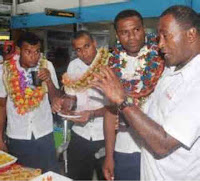Professional rugby players are retiring with the majority in financial hardship not long after.
As a professional or semi-professional rugby player you would have started earning money in your trade probably as early as 20. For Fijian rugby players this would be around 25.
A survey by NZ players association revealed that on average players stop playing at 30. Now that means you have only about 5 to 10 years to ply your game and earn money.
According to Sports Illustrated, 78% of NFL players will file for bankruptcy or face financial hardships only two years after playing their last game. NBA players face a similar fate with, 60% of players going broke five years into retirement.
The reasons for financial hardships vary, from lack of planning, over indulgence, bad investments and poor financial guidance. Or all of the above.
One factor in the above statistics is that players are earning much more money in their mid twenties than the average 20 year old. Also this is time when most young adults are learning personal finance through trial and error. But these players are making these mistakes with far more to lose.
Players are earning much more money in their mid twenties than the average 20 year old but also making these financial errors then.
After signing their first contract, athletes often face new family members and friends that come out the woodwork looking for help or investing for the next big thing.
Rugby players also face pressure in the locker room and society to spend big.
A player association has commented that players get tired of him telling them to stop spending their money and save.
I know of a renowned Fijian international who lost his savings and investments which he left to his family to manage, whilst he was playing rugby overseas.
What should you do to avoid these pitfalls
1. Set a monthly budget and follow it. Put aside at least 10% of your income as savings. Don't touch this money.
2. We recommend joining a players association for advise and support.
3. Speak to at least 3 financial advisors on investing. Don't go with with first one you speak to. Choose one that you understand trust and you feel you can work with.
4. Set aside at least 3 months wages for an emergency.
5. Study or plan for career to continue after rugby. Some players have even studied and got a degree whilst playing.

